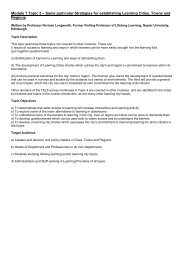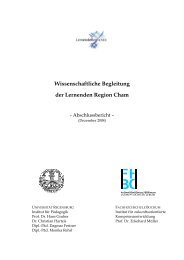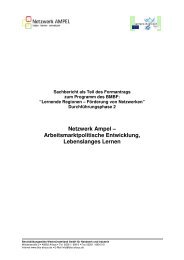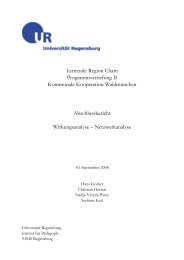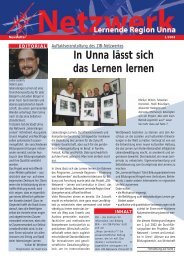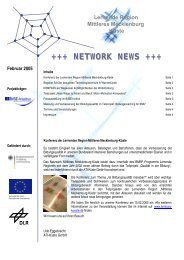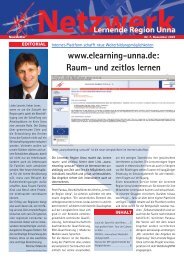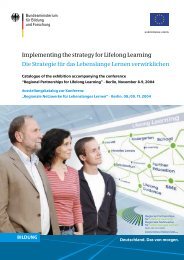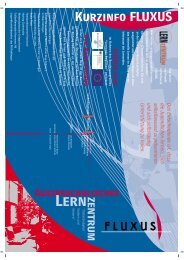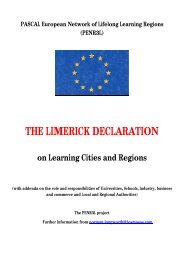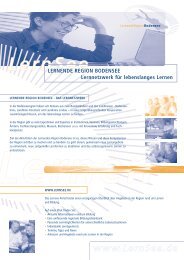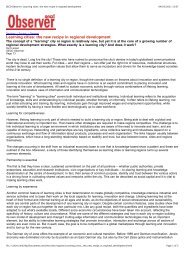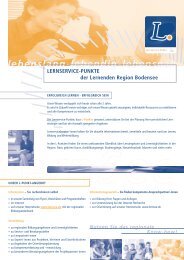SWOT-analysis as a basis for regional strategies - EUROlocal
SWOT-analysis as a basis for regional strategies - EUROlocal
SWOT-analysis as a basis for regional strategies - EUROlocal
Create successful ePaper yourself
Turn your PDF publications into a flip-book with our unique Google optimized e-Paper software.
<strong>for</strong> repeated encounters in markets and <strong>for</strong> social processes whereby new norms and<br />
values can be learnt, redundant institutions broken down, obsolete conceptions<br />
eliminated and antiquated, shared beliefs abolished. Such ‘unlearning’ can be<br />
expected to occur within the organisational learning process of <strong>regional</strong> strategic<br />
planning.<br />
What examples of these types of elements can then be identified in the <strong>SWOT</strong><br />
<strong>analysis</strong> included in our study? These are most clearly observable in two dimensions<br />
of <strong>regional</strong> <strong>SWOT</strong> <strong>analysis</strong>:<br />
• Organisational learning: the utilisation of experiences from previous<br />
programming periods and other <strong>regional</strong> planning instruments <strong>as</strong> factors<br />
contributing to and indicative of learning. This should be visible in the<br />
<strong>for</strong>mulation and re-<strong>for</strong>mulation of the new <strong>regional</strong> development programme.<br />
• Social learning: addressing the question of which actors and aren<strong>as</strong> are<br />
involved in the learning process, dealing with issues such <strong>as</strong> institutions,<br />
norms, social interactions and <strong>for</strong>ums within which these can be developed,<br />
maintained and re-<strong>for</strong>mulated (i.e. learnt and unlearnt). In contr<strong>as</strong>t to<br />
organisational learning, which is more concerned with the learning <strong>as</strong>pects of<br />
the process, the emph<strong>as</strong>is here is on actors.<br />
4.1 Organisational learning: utilisation of previous experiences from strategic<br />
planning<br />
In the introduction to this Chapter it w<strong>as</strong> <strong>as</strong>sumed that the learning of a region takes<br />
place through its organisational structure. This structure can also be called a system of<br />
actors, which – represented by its individual members – observes the needs <strong>for</strong><br />
planning, designs the plans, implements them, monitors the implementation, evaluates<br />
the output and results, and <strong>as</strong>sesses the longer-term effects.<br />
From the organisational or institutional learning perspective the above-mentioned<br />
process in its entirety should be linked, through a feedback loop, to the re-<strong>as</strong>sessment<br />
and re-defining of a developmental situation in some later point in time, and<br />
eventually to a re-designing of the plan. As the roles and positions of the various<br />
stakeholder organisations may change dramatically over time, and <strong>as</strong> new actors<br />
emerge and old ones disappear, one of the key qualities of a viable system is its<br />
flexibility, its ability to sustain changes in its environment and adjust its own structure<br />
accordingly.<br />
Thus, it can well be postulated that the generic prerequisites set <strong>for</strong> evolution of cooperation,<br />
<strong>as</strong> Robert Axelrod (1984) titled his much-acclaimed study, are the<br />
cornerstones <strong>for</strong> systemic learning <strong>as</strong> well. An event in which two actors choose to<br />
co-operate is typically preceded by a period during which they learned to make that<br />
choice. This period is in turn typically marked by intense and repeated interaction<br />
around concrete issues. The actors have thus had an opportunity to position<br />
themselves vis-à-vis the issue, each other and the entire dynamics of the process, that<br />
is, the history of each other’s changed relative positions at each particular point in<br />
41



